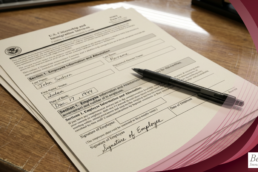As the E-2 Treaty Investor visa becomes an increasingly popular category for foreign business expansion efforts into the U.S., it should be remembered that the “spirit” of the E-2 is to create jobs for U.S. workers and to stimulate the U.S. economy with commercial interaction with the treaty country.
The E-2 visa allows a foreign investor to enter the U.S. when they are investing a substantial amount of capital into a U.S. enterprise that is owned and controlled in the majority (at least 50%) by a treaty national(s). The enterprise cannot be marginal – that is, it must be a real, operating commercial enterprise that produces a service or commodity; it must generate enough revenue to support more than just the investor. Any employees applying for E-2 visas as support personnel of the U.S. investment company also must possess supervisory skills or “special qualifications” essential to the enterprise and which cannot be obtained from the U.S. labor force. Further, the U.S. Foreign Affairs Manual (FAM) was edited in May of 2019 to specifically remind Consular Officers of the current administration’s Buy American Hire American (“BAHA”) directive:
On April 18, 2017, the President signed the Executive Order on Buy American Hire American (E.O. 13788), intended to “create higher wages and employment rates for workers in the United States, and to protect their economic interests.” The goal of E.O. 13788 is to protect the interests of United States workers in the administration of our immigration system, including through the prevention of fraud or abuse. You must also remember that the basis of this classification lies in treaties which were entered into, at least in part, to enhance or facilitate economic and commercial interaction between the United States and the treaty country. It is with this spirit in mind that cases under INA 101(a)(15)(E) should be adjudicated.
Given this, what happens when a foreign treaty company is contracted by a U.S. firm for the provision of its professional services requiring numerous foreign personnel? Notwithstanding the foreign firm’s substantial and qualifying investment in a new U.S. enterprise, will those foreign employees qualify for E-2 visas given BAHA? What if they’ll be working work off-site from the investment company? How far does an E-2 enterprise need to go in proving the specialized and essential skills of its foreign employees?
The FAM addresses this situation, discussing a precedent decision of the Board of Immigration Appeals in the Matters of Walsh and Pollard, Int. Dec. #3111 (BIA 1988). The fact pattern in this case involved a UK automotive designer, IAD Ltd., which was contracted by General Motors (GM) for the purpose of redesigning GM’s line of cars in a “smaller, more European fashion.” This design knowledge was unavailable in the U.S., and the contract called for specific, project-oriented services. Pursuant to the contract, IAD Ltd. created a subsidiary in the U.S. to ensure fulfillment of the contract and to service their employees. IAD rented office space, purchased office furniture, hired two, U.S. citizens to assist the UK designers in their relocation, and established a corporate bank account of $15,000. The BIA found this investment to be sufficient under the “substantiality” requirement of the E-2 regulations, and it allowed for E-2 visas to be issued to numerous IAD foreign employees.
It should be noted that the Walsh/Pollard decision is over 30 years old. While it is still an existing precedent decision, today under BAHA, E-2 investors should be highly conscious of the way their investment enterprise is established in the U.S. Although there is no express or explicit statutory language requiring a minimum dollar amount, Consular Officers will want to ensure that the investment substantial in a proportional sense to total start-up costs of the overall business in that particular industry. The investment must be large enough to ensure the investor’s financial commitment to the success of the business, and also of a magnitude that, under the investor’s direction and development, will generate revenue and create jobs for U.S. workers.
Additionally, E-2 companies should prepare a strong case for visa applications submitted by essential employees. The greatest area of confusion surrounding Walsh/Pollard initially concerned the issue of the “job shop” or “employment agency” which typically involves a contract between a foreign company and U.S. customer to fill employment positions in the U.S. For instance, if GM had contracted IAD to provide foreign workers directly to GM to perform pre-designated duties of internal GM positions it couldn’t fill for a variety of reasons (e.g. the unavailability of that type of worker, cost of locally hired workers, etc.), the BIA would have denied the E-2 visas for IAD’s essential employees. By contrast, however, the IAD foreign employees who came to the U.S. to perform services on-site at GM came to fulfill certain responsibilities pursuant to a very specific design project. IAD designers in the UK were demonstrably highly qualified to provide the specialized design services service on a temporary project basis. Noting that they did not come to the U.S. to fill employee vacancies of GM, the BIA held that it was irrelevant that the design activities could have been performed either at IAD in the UK, or in the U.S. at GM’s facilities.
With respect to hiring essential employees, the FAM places the burden of proof on the company and applicant in establishing the applicant’s special qualifications essential to U.S. operations. Here, Consular Officers have a fair amount of discretion in approving visas for essential employees, as there is no “mechanical application of a bright-line test.” The FAM provides:
The applicant bears the burden of establishing at the time of initial application and each subsequent application not only that he or she possess the requisite specialized skills but, also, the length of time that such skills will be needed. Some skills may be essential for as long as the business is operating. Others, however, may be necessary for a shorter time, such as in start-up cases, and it is reasonable that after a short period of time the enterprise will be able to train American employees the specialized skills needed to successfully operate the enterprise. In assessing the claimed duration of essentiality, consider the time needed to onboard the employee and time to perform the contemplated duties. What is highly specialized and unique today might not be in a few years.
In assessing the specialized nature of the skills sought and whether or not the applicant possesses such knowledge, Consular officers will consider the E-2 applicant’s experience, training and proven expertise, the uniqueness of such skills, the availability of U.S. workers, wages paid, and the overall position in the U.S. Thus, E-2 enterprises should be prepared to address long-term need for essential employees on an on-going basis when the employees will be engaged in functions such as continuous development of product improvement, quality control, or provision of a service otherwise unavailable (as in Walsh/Pollard). Likewise, employers should confirm when an employee’s skillset is for a short-term need position (e.g., one or two years) when the purpose of the employee(s) relate(s) to start-up operations (of either the business or a new activity by the business), or to training and supervision of technicians employed in manufacturing, maintenance and repair functions. Under BAHA, there is a likely presumption by Consular officers that the E-2 employee will train U.S. workers within a reasonable time to replace the foreign national, especially for positions within a start-up that require skills which are ordinarily transferrable with training.
Berardi Immigration Law has significant experience in successfully representing international treaty investors and essential employees. We provide top-notch immigration legal services for start-ups, acquisitions, and established companies in the U.S. Contact Jennifer Behm for a consultation today.
Ready to have Berardi on your side?
Whether you’re a business looking to hire or a professional hoping to relocate, immigration law can be complicated. But you don’t have to do it alone. Put our experience to work for you.



